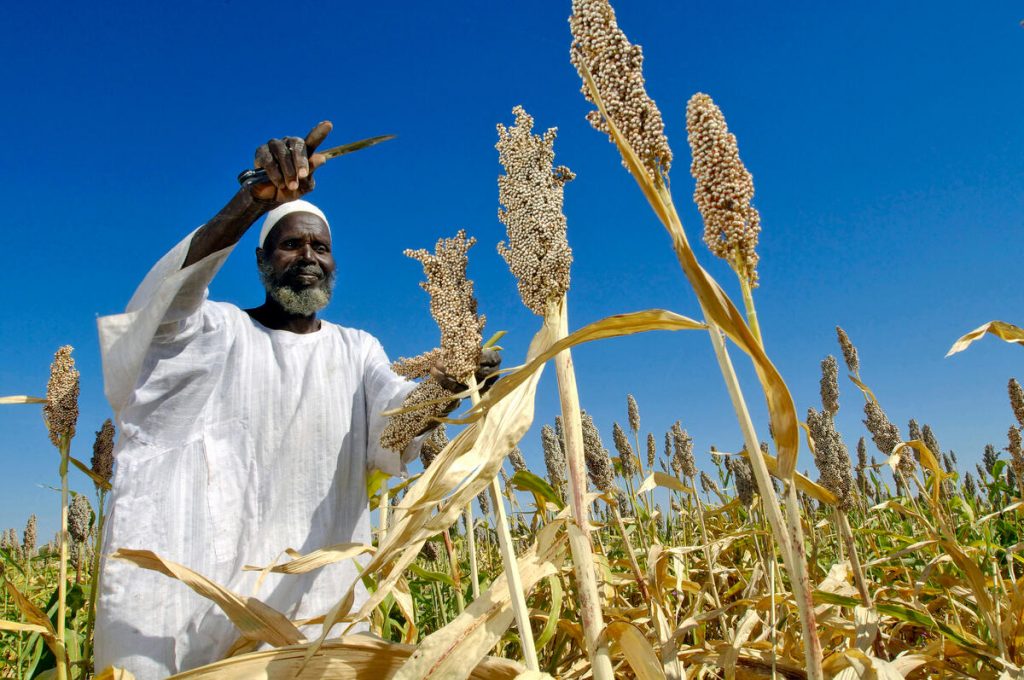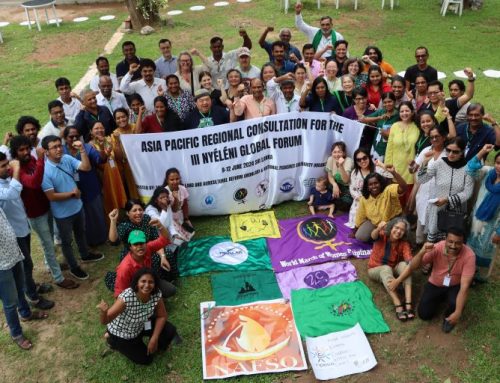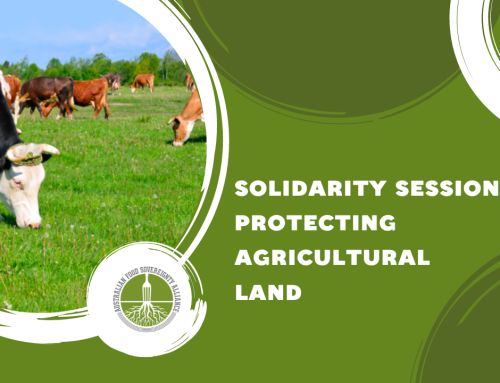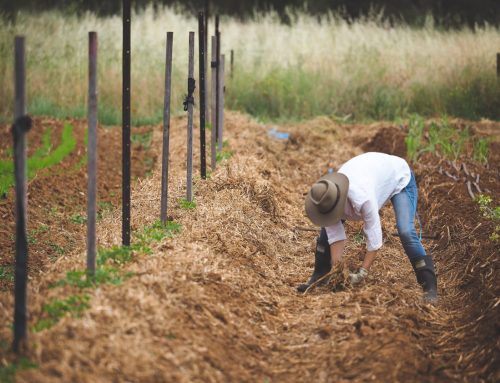Declaration from the 2022 Food Sovereignty Convergence
From 17 to 18 October 2022, small-scale farmers, allies and First Peoples converged from across Australia to meet on Bundjalung Country, paying our respects to Elders past and present. We held our annual Food Sovereignty Convergence at Echo Valley Farm, the home and agroecological enterprise of AFSA’s Vice-President Randal Breen, his wife Juanita and their family. We kicked off with an Agroecology Exchange, where Randal shared with a group of farmers and food sovereignty warriors four principles that underpin Echo Valley’s ethos, to produce food that is: Good for the animals; good for the land; good for the farmer; and good for you.
This year’s Convergence marked the first time we were able to gather in person following two years of the ongoing COVID-19 pandemic. The events that have unfolded since 2019 are a manifestation of all that AFSA fights against, including devastating bushfires, rising temperatures and wide-scale flooding as a result of climate change. The pandemic has illuminated the fragility and injustice of globalised food systems, whereby under-regulated free trade spawns increasing biosecurity and public health threats, and supermarket shelves are left bare while food prices soar.
Looking to the future of food sovereignty in the wake of ongoing crises, this year’s Convergence empowered us to deepen our resolve and grow our capacity to defend our right to democratically participate in food and agriculture systems, while enjoying time together to build greater solidarity in the food sovereignty movement amongst First Peoples, farmers, farm and food system workers, chefs, academics, and other activists.
We commenced Convergence with a Decolonial Circle, to discuss AFSA’s role as a non-indigenous-led organisation working towards strengthening solidarity with First Peoples. This discussion comes at a critical time in Australia’s history, as the Uluru Statement from The Heart sees commitment from the Federal Government, and terms for reforms around Voice, Treaty and Truth are negotiated with First Peoples. When the Statement was first brought to Government in 2017, AFSA was vocal about its support. Since then, our engagement with First Peoples has deepened, prompting us to consider the nuance and complexities of Indigenous perspectives on the Statement, where reforms remain under a system of government responsible for colonial violence for over 200 years.
During the Decolonial Circle, we agreed that it is not AFSA’s role to take a position for or against the Statement. Rather, we commit to promoting a diversity of First Peoples’ voices on the Statement and the proposed referendum. We heard from protectors at Deebing Creek, part of which remains the sacred burial site of a massacre in Ipswich near Brisbane. First Peoples and non-indigenous allies protecting the site from encroaching development for decades, spoke of ongoing colonial violence from government, who have denied them their right to land and water. The history of Deebing Creek is deeply saddening, and echoes many attempts made by colonial settlers to erase First Peoples’ culture, knowledge and practice. We recognise the Yuggera Ugarapul people as the traditional and rightful owners of Deebing Creek, and will continue to promote their voices as development plans continue.
The all-volunteer National Committee updated members on key activities throughout the past year, inviting them to hold kitchen table conversations on the evolving updated Peoples’ Food Plan and AFSA’s third book Eating Democracy, both of which will be released in 2023. We also shared an update on the work our legal team has undertaken to launch a Legal Guide for Members, a document that will enable members to navigate the common legal barriers to food sovereignty and small-scale farming in particular. Our members provided feedback on AFSA’s Values & Theory of Change, informed by La Via Campesina’s 7 pillars of food sovereignty, a statement which will ground our mission and vision ahead.
During a First Peoples First discussion, we addressed the complexity of farming on unceded land, the need for control over native food enterprises to be firmly in the hands of First Peoples, and supporting members to learn to listen to Country. We spoke about progress on AFSA’s First Peoples First Strategy, such as paying the rent to Indigenous-owned and -led food enterprises. Although members agreed that this Strategy has provided a solid foundation for examining our place in a settler-colonial food system, we have a long way to go in terms of strengthening our solidarity with First Peoples, and we agreed to establish a First Peoples Advisory Group to guide our work. A call to action emerged from this discussion, to establish ongoing ‘Yarns on Farms’ for members to engage with local mobs in a safe and appropriate setting.
A parallel session on agroecology brought forward an invitation by our member Ediblescapes, to partner with them on a community-led Agroecology Lighthouse, which will become a hub for learning and engaging with agroecology as a practice and a social movement. We also committed to further developing and expanding our Agroecology Exchanges, which to date have been hosted at Jonai Farms on Djaara Country in Victoria and Echo Valley Farms on Bundjalung Country in southern Queensland. More broadly, we spoke about the value of community gardens, and in the year ahead, we will look to renewing our focus on allies in the community garden space, particularly in rural and remote areas, where lack of access to fresh, nutritious food remains a serious issue.
In a session on distribution challenges, farmers, academics and allies gathered to discuss the growing movement of community-supported agriculture (CSA) and other solidarity economies. As CSA is still fairly new in Australia, AFSA’s role as conduit to connect aspiring CSA farmers with established farmers, and eaters to their local CSA, and to provide a library of CSA resources is clear. Following Convergence, we will work to build horizontal knowledge sharing on CSAs and other alternative distribution models through AFSA’s website, newsletters and membership.
We acknowledged that many of the challenges we face relate to land tenure, prompting a discussion on Farming on Other People’s Land (FOOPL). The reality that many young people cannot envision owning a home extends at least equally to dreams of owning land for farming. The problem of farming on unceded land and building bridges with First Peoples to return to Country through land and farm sharing agreements also grounded this discussion. We see a clear directive to hold discussions on community land trusts as a mechanism for overcoming barriers to land tenure. At this year’s AGM, we established a small (and hopefully growing) dedicated FOOPL Fund to be allocated to members needing assistance in this space.
Concluding the unconference, we turned our attention to a vital part of movement building: collectivisation and collaboration. A common thread that weaved its way through our discussions was an acknowledgement of the diversity of needs across local communities, states and territories. A stark symbol of these differences could be felt as the sun shone on Echo Valley Farm in Queensland, while our Victorian and NSW members battled heavy rain and floodwaters. We committed to create space for state leaders within AFSA, who will be responsible for galvanising the food sovereignty movement more locally, and provide an opportunity to engage more closely with policymakers on the issues impacting each state.
It was acknowledged that AFSA’s strength remains as a national body, advocating for wide-scale food and agricultural transformation in line with principles of food sovereignty. We note a battle lost in spite of several years of advocacy as FSANZ announced tighter regulation on the production and sale of berries, leafy greens and melons, arising from industrial production but creating another inappropriate burden on small-scale farmers. We’re calling on allies from every corner of the country to support a national ‘License to Sell Lettuce’ campaign.
As ground-up collectivising takes shape, we are grateful for growing solidarity with international allies, where AFSA has also had the opportunity to reconnect in person this year. AFSA participates in global meetings as a member of the IPC for Food Sovereignty, which is making strides towards embedding smallholders’ rights in the upcoming Global Biodiversity Framework at COP 15 in Montreal, as well as our ongoing relationships with La Via Campesina, Urgenci: the International Network for CSA, and the Civil Society and Indigenous Peoples’ Mechanism (CSIPM). We are also excited about a developing relationship with the Oxford Real Farming College – watch this space!
We look forward to continuing or commencing to work in solidarity with the many excellent organisations and people acting for food sovereignty in Australia and globally, as well as the many organisations working at the local level.
All this and more we commit to in our struggle for food sovereignty locally and globally. The members once again democratically elected a vibrant National Committee of farmers, food system workers, educators, and academics to lead the important work ahead of us.
After two consecutive Convergence events in Queensland, we conclude this year’s Declaration with an announcement that next year’s event will be held in New South Wales. Stay tuned for further information in the coming months.
Viva la via campesina! Viva la revolución!






